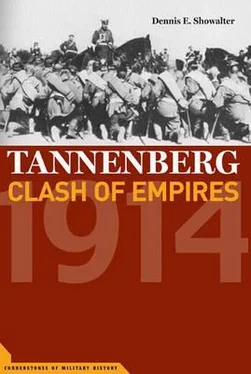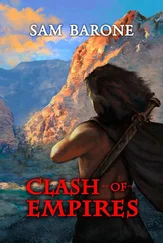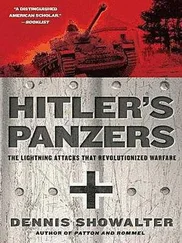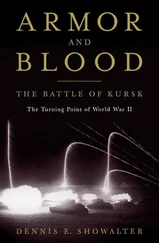43Cf. Jagow’s comments of June 15 to the British Ambassador; and Goschen to Grey, June 16, 1914, in BD X, 2, Nr. 550. The Novoye Vremya article is also extensively discussed in DDF, 3rd Series, X, Nr. 369. The quotation evaluating Sukhomlinov’s character is from Bernhard von Eggeling, Die russische Mobilmachung und der Kriegsausbruch (Oldenburg, 1919), 9.
44Alex N. Dragnich, Serbia, Nicola PaŠić, and Yugoslavia (New Brunswick, N.J., 1974), 92.
45For the diplomats’ perspective cf. Tschirsky to Bethmann, Feb. 13, 1914, PAAA, Russland 72/96; Treutler to Bethmann, Mar. 4, 1914, PAAA, Deutschland 131/36; Berchtold to Franz Josef, July 14, 1914, in Ludwig Bittner, et. al. Oesterreich-Ungarns Aussenpolitik von der bosnische Krise 1908 bis zum Kriegsausbruch 1914, 8 vols. (Vienna, 1930), VIII, Nr. 1072. (Hereafter cited as Oe-U). For the soldiers cf. the German military attaché’s reports to the foreign ministry of Feb. 11, 1914, PAAA, Russland 72/96; Mar. 3 and 17, 1914, PAAA, Deutschland 131/36; May 30, 1914, PAAA, Russland 72/97; and July 13, 1914, in Immanuel Geiss, ed., Julikrise und Kriegsausbruch 1914, 2 vols. (Hanover, 1963–64), I, Nr. 84. General treatments of the decision making climate in Vienna at the time of Sarajevo include M. B. A. Peterson, “Das österreichisch-ungarische Memorandum an Deutschland vom 5. Juli 1914,” Scandia XXX (1964), 138–190; Hugo Hantsch, Leopold Graf Berchtold, 2 vols. (Graz, 1963), II, 608 passim; and Gary W. Shanafelt, The Secret Enemy: Austria-Hungary and the German Alliance, 1914–1918 (Boulder, Colo.: 1985), 7 ff.
46Cf. inter alia Alan N. Sabrosky, “From Bosnia to Sarajevo,” Journal of Conflict Resolution XIX (1975), 3–24; William Jannen, Jr., “The Austro-Hungarian Decision for War in July, 1914,” Essays on World War I, ed. S. R. Williamson, P. Pastor (New York, 1983), 55–81; Remak, “Third Balkan War,” 363.
47Samuel R. Williamson, Jr., “Vienna and July 1914: The Origins of the Great War Once More,” in Essays on World War I, 9–36.
48Waldhausen to Bethmann, Apr. 19, 1914, PAAA, Deutschland 143.
49On the changing military balance in the Balkans cf. Gunther Rothenberg, The Army of Francis Joseph (Lafayette, Ind., 1976), 170 ff.; and Horst Brettner-Messler, “Die Balkanpolitik Conrad von Hötzendorfs von seiner Wiederernen-nung zum Chef des Generalstabes bis zum Oktober-Ultimatum 1913,” Mitteilungen des Österreichischen Staatsarchivs XX (1967), 180 ff.
50John R. Lampe, “Financial Structure and the Economic Development of Serbia, 1878–1912,” (Ph.D. Dissertation, University of Wisconsin, 1971).
51Berchtold to Czernin, Nov. 26, 1913, Oe-U, VII, 592. For a more general example of this attitude see the diaries of Josef Redlich, Schicksalsjahre Österreich, 1908–1919. Das politische Tagebuch Joseph Redlichs, ed. F. Fellner, Vol. I (Graz, 1953), 209 passim.
52Cf. D. C. Watt, “The British Reactions to the Assassination at Sarajevo,” European Studies Review I (1971), 233–247; and A. J. A. Morris, The Scaremongers: The Advocacy of War and Rearmament 1896–1914 (London, 1984), 354 ff.
53Grey to Bunsen, BD XI, Nr. 91.
54Anthony Di Ionic, “Italy, Austria-Hungary, and the Balkans, 1904–1914: Italy’s Appraisal” (Ph.D. Dissertation, University of Illinois, 1980), documents this process from the perspective of another regional power.
55Cf. David Mackenzie, “Serbian Nationalist and Military Organization and the Piedmont Idea, 1844–1914,” East European Quarterly XVI (1982), 323–344; and Ilja Garasanin: Balkan Bismarck (Boulder, Colo., 1985).
56The process of decision making in Serbia in 1914 remains controversial. The most complete collection of Serbian diplomatic documents from the period is Dokumenti o spoljnoj politici Krajelvine Srbije, 1903–1914, Vol. VII, Part 2, 1/14 maj - 22. juli/4. avgust 1914, ed. V. Dedijer, Z. Amic (Belgrade, 1980). Samuel R. Williamson, Jr., “The Origins of World War I,” The Journal of Interdisciplinary History XVIII (1988), 810–811; and Gale Stokes, “The Serbian Documents from 1914: A Preview,” Journal of Modern History XLVIII, Supplement (1976), both exaggerate Russia’s importance. The best secondary accounts in English remain Joachim Remak, Sarajevo: The Story of a Political Murder (New York, 1959); and Vladimir Dedijer, The Road to Sarajevo, (New York, 1966). Friedrich Würthle, Die Spur fuhr nach Belgrade (Vienna, 1975), expresses its approach in its title. Willibald Gutsche, Sarajevo 1914 (Berlin, 1984) is a recent East German work denying any significant importance to the question of Serbia’s role in the assassination.
57To the seemingly endless literature on Germany’s behavior in the July Crisis have recently been added Hartmut Pogge von Strandmann, “Germany and the Coming of War,” in The Coming of the First World War, ed. R. J. W. Evans and H. Pogge von Strandmann, (Oxford, 1988), 87–123; Fritz Fischer, Juli 1914: Wir sind nicht hineingeschlittert (Hamburg, 1983); Egmont Zechlin, “Julikrise und Kriegsausbruch 1914,” in Politik und Geschichte: Europa 1914: Krieg oder Frieden, ed. Landeszentrale für politische Bildung (Kiel, 1985), 49–96; and Klaus Hilde-brand, “Julikrise 1914. Das europäische Sicherheitsdilemma,” Geschichte in Wis-senschaft und Unterricht, XXXVI (1985), 469–502.
58Leichenfeld to Hertling, June 4, 1914, in Bayerische Dokumente zum Kriegsausbruch und zum Versailler Schuldspruch, ed. Pius Dirr (Munich, 1928), 110 ff.
59A. J. P. Taylor, The Struggle for Mastery in Europe, 1848–1918 (Oxford, 1954), 518 ff.
60Wilhelm Groener, Der Weltkrieg und seine Probleme (Berlin, 1920), 51.
61Germany’s preparations, or lack of them, are discussed in Lothar Bur-chardt, Friedenswirtschaft und Kriegsvorsorge. Deutschlands wirtschaftliche Bestrebungen vor 1914 (Boppard, 1968), and Gerhard Hehr, Walther Rathenau und sein Verhaltnis zu Militär und Krieg (Boppard, 1983), 146 passim.
62For Moltke cf. especially Correlli Barnett, The Swordbearers (London, 1963), 15 ff.; and Isabel Hull, The Entourage of Kaiser Wilhelm II, 1888–1918 (Cambridge, 1982), 239 ff.
63Sean M. Lynn-Jones, “Détente and Deterrence: Anglo-German Relations, 1911–1914,” International Security XI (Fall, 1986), 121–150.
64Cf. Manfred Rauh, “Die ‘deutsche Frage’ von 1914: Weltmachtstreben und Obrigkeitsstaat?” in Die Deutsche Frage im 19. und 20. Jahrhundert, ed. J. Becker, A. Hillgruber (Munich, 1983), 109–166; James M. McPherson, Battle Cry of Freedom: The Civil War Era (New York, 1988) 272 n.78; and Richard N. Current, Lincoln and the First Shot (Philadelphia, 1963).
65E. G. Tschirsky to Bethmann, July 2, 1914, and Berchtold’s note of a July 2 conversation with Tschirsky in Geiss, Julikrise I, Nrs. 11, 14. Cf. also F. Fellner, “Die ‘Mission Hoyos’” in Deutschlands Sonderung von Europa, 1862–1945 (Frankfurt, 1984), 283–316.
66For Sazonov’s Serbian dilemma cf. in particular Strandtmann to Sazonov and Sazonov to Strandtmann, July 24, 1914, Int. Bez I, 5, Nrs. 22, 36. The protocol of the Crown Council is most readily available in Geiss I, Nr. 286. Lieven, Russia and the Origins of the First World War, 141 ff., includes a summary, based on the unpublished memoirs of Finance Minister P. A. Bark, that modifies details without altering substance.
67Cf. Friedrich Graf Pourtalés, Meine letzten Verhandlungen in St. Petersburg, ende Juli 1914 (Berlin, 1927), 22–23; Pourtalés to Jagow, July 26, 1914, DD I, 217; Pourtalés to Bethmann July 25 (sent July 26, 12:20 a.m.), July 26, 3:25 p.m., and July 27, 1:00 p.m., in PAAA, Russland 72/97. and Szapary to Berchtold, July 26, 1914, Oe-U VIII, 10835. The assigned date of the latter document, July 27, is corrected following Geiss, Julikrise II, Nr. 397.
Читать дальше












